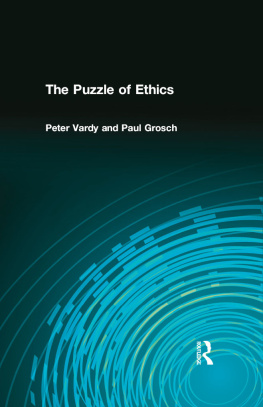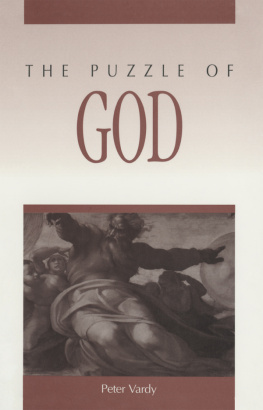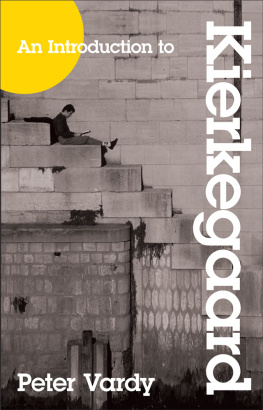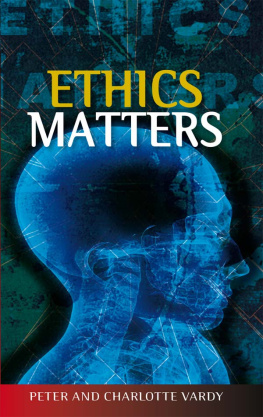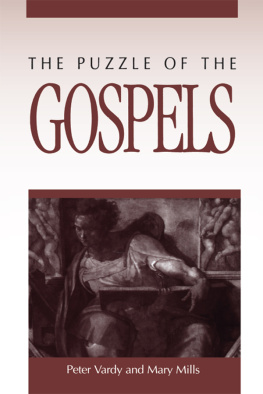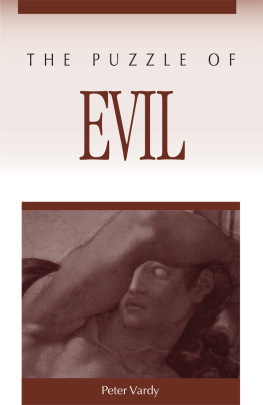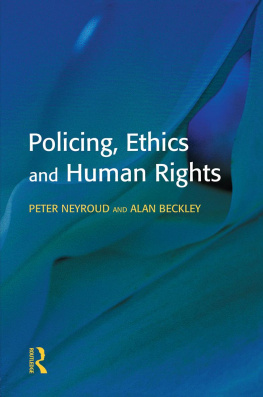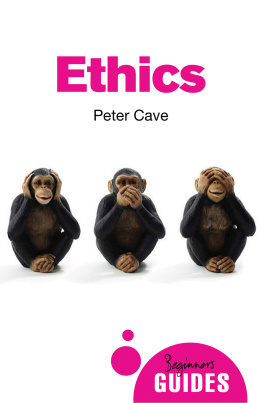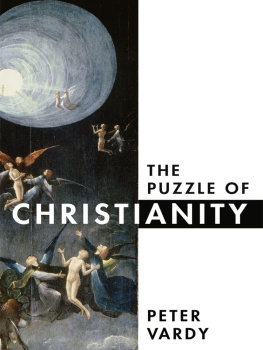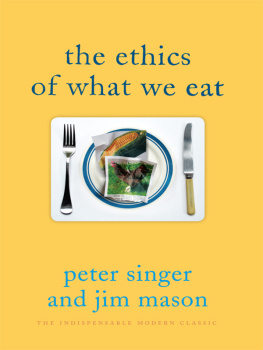THE PUZZLE OF ETHICS
Books by Peter Vardy available from M.E. Sharpe
THE PUZZLE OF EVIL
THE PUZZLE OF GOD
THE PUZZLE OF THE GOSPELS (with Mary Mills)
The Puzzle of Ethics
PETER VARDY AND PAUL GROSCH
First published 1994 by M.E. Sharpe
Published 2015 by Routledge
2 Park Square, Milton Park, Abingdon, Oxon OX 14 4RN
711 Third Avenue, New York, NY 10017, USA
Routledge is an imprint of the Taylor & Francis Group, an informa business
Copyright 1994 by Peter Vardy and Paul Grosch
No part of this book may be reprinted or reproduced or utilised in any form or by any electronic, mechanical, or other means, now known or hereafter invented, including photocopying and recording, or in any information storage or retrieval system, without permission in writing from the publishers.
Notices
No responsibility is assumed by the publisher for any injury and/or damage to persons or property as a matter of products liability, negligence or otherwise, or from any use of operation of any methods, products, instructions or ideas contained in the material herein.
Practitioners and researchers must always rely on their own experience and knowledge in evaluating and using any information, methods, compounds, or experiments described herein. In using such information or methods they should be mindful of their own safety and the safety of others, including parties for whom they have a professional responsibility.
Product or corporate names may be trademarks or registered trademarks, and are used only for identification and explanation without intent to infringe.
Library of Congress Cataloging-in-Publication Data
Vardy, Peter.
The puzzle of ethics / Peter Vardy, Paul Grosch.
p. cm.
Originally published: London : Fount, 1994.
Includes bibliographical references and index.
ISBN 0-7656-0163-X (hardcover: alk. paper). ISBN 0-7656-0164-8 (pbk.: alk. paper)
1. Ethics. 2. Applied ethics. I. Grosch, Paul. II. Title.
BJ1012.V37 1997
170-dc21 97-2913
CIP
ISBN 13: 9780765601643 (pbk)
ISBN 13: 9780765601636 (hbk)
TO
LINDSAY GROSCH AND CHRISTIAN VARDY
CONTENTS
Both authors owe a great debt to their students past and present. Responsibility for the errors and omissions in this book rests entirely with the authors, however there would have been more of them were it not for the help of those who read individual chapters and offered their advice. Peter Vardy wishes to acknowledge help given by Michael Barnes SJ, Alan Carter, Bernard Hoose, Gerry Hughes SJ, Janice Thomas and Anne Vardy. Paul Grosch wishes to thank Adrian Mills and Alan Gorman for the many discussions on the nature of justice. He has also benefited from discussions with his colleagues: Dilys Wadman, Liz Stuart, Rachael Quinlan, Adrian Thatcher, Jim Little, Jon Goulding, Gordon Bartlett and Alan Cousins. He wishes to record his special thanks to Anne Littlejohn and David Benzie for their help in taming recalcitrant word-processors when time was fast running out.
Sex before marriage is wrong; Those who perform abortions are murderers; Homosexuality is unnatural; There is no real difference between killing a baby and killing a dolphin; Multinational companies that exploit tropical rain forests are evil; Women and men should always be treated equally; Capital punishment is right for those who rape or murder we are all familiar with the bewildering variety of moral judgements which individuals and groups of people make. Often these positions are held with passion, conviction and great sincerity, yet many of those who have strong views on moral issues have not really stopped to think why they take a particular stance and, if they were challenged, they might find it difficult to justify their position.
All of us have to make moral decisions in life from the smallest ones (whether to pay for a bus ticket if we can get away with not paying; whether to pay for using the firm or the colleges photocopier for our private purposes; whether to declare all our income to the tax authorities) to the much larger issues that sometimes dominate the headlines. This book examines the background to these issues and also looks at some suggested solutions as well as their difficulties. It may seem as though examining the approaches of Aristotle, Plato and their successors has little to do with life in the last few years of the twentieth century, yet this is not the case in many ways the issues that the great philosophers have addressed over the last two and a half thousand years are the same as those that face us today, only their practical application has altered.
Most people do not like to think for themselves they prefer to take the easy way and to follow the crowd or the dictates of their group. Thinking philosophically is not easy it involves challenging our own preconceptions and this can be uncomfortable. Sometimes those things which we feel most certain about may be questioned and this can shake the very roots of our most basic beliefs. Plato recognized this would happen he thought that philosophers would be rejected, mocked, misunderstood and despised and instead people would admire those politicians and other leaders who were skilled in rhetoric and who could flatter and persuade. The philosopher would challenge the status quo and the accepted wisdom of his society and would be considered dangerous. Platos teacher, Socrates, suffered exactly this fate and was condemned to death on a charge of corrupting the young as he got young people to think for themselves and not simply to accept the values of their parents. The situation has not changed much in two and a half thousand years. Today philosophers are more likely to be ignored than put to death, although in many countries imprisonment is often their fate. This book, therefore, deals with dangerous ideas.
The terms Ethics and Morality have come to be treated as almost identical in meaning, but they have different derivations. Ethics comes from the Greek word ethikos which relates to ethos or character. It is sometimes translated custom or usage so it refers to the customary way to behave in society. Ethical behaviour, therefore, is behaviour which is in accordance with a virtuous character. Aristotle used the word in this way Aristotle maintained that virtue is happiness and he claims that the pursuit of virtue is the highest and noblest aim for a human being. In his book The Nicomachean Ethics, Aristotle maintains that a human beings highest happiness comes from philosophic speculation but that this must be combined with a life of prudence and the search for virtue. Becoming virtuous involves the individual establishing a habit of virtuous behaviour and this is directly related to a virtuous character.
Morality comes from the Latin word moralis particularly as used in Ciceros commentaries on and translations of Aristotle. Morality is more concerned with which actions are right or wrong rather than with the character of the person who performs these actions. Today the two terms, ethics and morality, are often interchanged with particular philosophers wishing to emphasise one or another aspect.
In this book the field of ethics will be taken to cover not just those actions which are right or wrong but will also explore the fundamental principles which lie behind these actions as well as, at least at times, the issue of virtue that so preoccupied Aristotle and many of his successors. We shall see, however, that Aristotles approach has been subject to considerable criticism.


